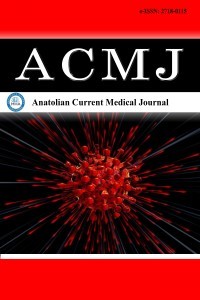1.
Ammirati AL. Chronic kidney disease. Rev Assoc Med Bras2020; 66: 53-9.
2.
Agarwal AK, Ahmad S, Allon M. Handbook of dialysis;Wolters Kluwer Health: Philadelphia, PA, USA, 2015; ISBN9781451144291.
3.
Ibrahim S, El Salamony O. Depression quality life andmalnutrition- inflammation scores in hemodialysis patients. AmJ.Nephrol 2008; 28: 784-91.
4.
Pop-Jordanova N, Polenakovic M. Alexithymia construct indialysis patients. BANTAO Journal 2015; 12: 45-51.
5.
Akyuz O, Parmaksiz E, Ardahanli I. Investigation of therelationship between Biochemical Parmeters, Alexithymia andStress levels in hemodialysis patients. South Clin IstEuras 2021;32: 13-8.
6.
Christensen AJ, Ehlers SL. Pyschological factors in end stagerenal disease: An emerging context for behavioral medicineresearch. J Consult Clin Psychol 2002; 70: 712-24.
7.
Herrmann C. International experiences with the hospital anxietyand depression scale-a review of validation data and clinicalresults. J Psychosomatic Res 1997; 42: 17-41.
8.
Salbas E. The Twenty-Item Toronto Alexithymia Scale (TAS-20),2016. Available at: http://www.ftronline.com/toronto-aleksitimi-olcegi/. Accessed May 20, 2017.
9.
Mattila AK, Salminen JK, Nummi T, Joukamaa M. Age isstrongly associated with alexithymia in the general population. JPsychosomatic Research 2006; 61: 629-35.
10.
Salminen JK, Saarijärvi S, Äärelä E, Toikka T, Kauhanen J. Prevalenceof alexithymia and its association with sociodemographic variablesin the general population of Finland. J Psychosomatic Research1999; 41: 75-82.
11.
Loas G, Fremaux D, Otmani O, Verrier A. Prevalence ofalexithymia in a general population. Study in 183 “normal”subjects and in 263 students. Annales Medico-psychologiques1995; 153: 355-7.
12.
Batıgu¨n AD, Bu¨yu¨kşahin A. Alexityhmia: PsychologicalSymptoms and Attachment Styles. Klinik Psikiyatri 2008;11:105-14.
13.
Pojatic D, Tolj I, Pezerovic D, Degmecic D. Systematic review ofalexithymia in the population of hemodialysis patients. J ClinMed 2021; 10: 28-62.
14.
Lai C, Aceto P, Luciani M, et al. Emotional management andbiological markers of dietetic regimen in chronic kidney diseasepatients. Ren Fail 2017; 39: 173-8.
15.
Onor M, Trevisiol M, Spano M, Aguglia E, Paradiso S.Alexithymia and aging: a neuropsychological perspective. J NervMent Dis 2013; 198: 891-5.
16.
Fukunishi, I. Psychosomatic aspects of patients on hemodialysis.With special reference to aged patients. Psychother Psychosom1989; 52: 51-7.
17.
Pojatic D, Nikic D, Tolj I, Pezerovic D, Šantic A, Degmecic D.Alexithymia, phosphorus levels, and sleep disorders in patientson hemodialysis. J Clin Med 2022; 11: 3218.
18.
Besharat MA, Shahidi S. What is the relationship betweenalexithymia and ego defense styles? A correlational study withIranian students. Asian J. Psychiatry 2011; 4: 145-9.
19.
Cabras PL, Albanesi G, Calabresi M, Martinelli F. Chronicdialysis and forcing of the ability to fantasize. Evaluation of thealexithymic phenomenon in a group of dialyzed patients. RivPatol Nerv Ment 1983; 104: 213-23.
20.
Aggarwal HK, Jain D, Dabas G, Yadav RK. Prevelance ofdepression, anxiety and insomnia in chronic kidney diseasepatients ant theirco-relation with the demographic variables. Pril2017; 38: 35-44.
21.
Loosman WL, Rottier MA, Honig A, Siegert CEH. Association ofdepressive and anxiety symptoms with adverse events in Dutchchronic kidney disease patients:a prospective cohort study. BMCNephrol 2015; 16: 155.
22.
Duan D, Yang L, Zhang M, Song X, Ren W. Depression andassociated factors in Chinese Patients with chronic kidneydisease without dialysis: a cross-sectional study. Front PublicHealth 2021; 9: 605-51.
23.
Wang X, Shen B, Zhaung X, Weng X. Investigating factorassociated with depressive symptoms of chronic kidney diseasein Chine with type 2 diabetes. J Diabetes Res 2017; 17: 698-97.
24.
Kojima M, Hayano J, Suzuki S, et al. Depression, alexithymia andlong-term mortality in chronic hemodialysis patients. Psyhother.Psychosom 2010; 79: 303-11

